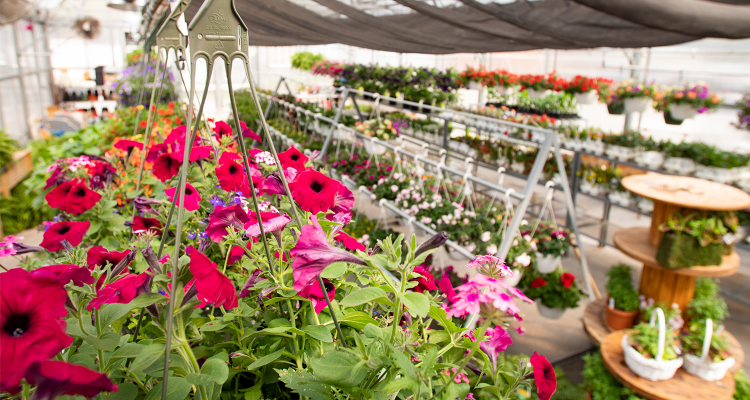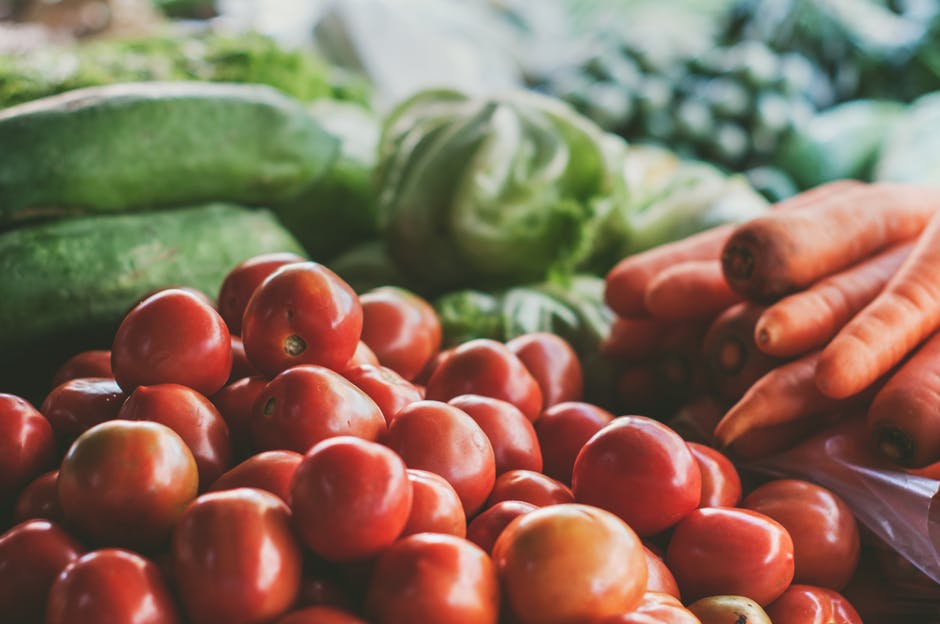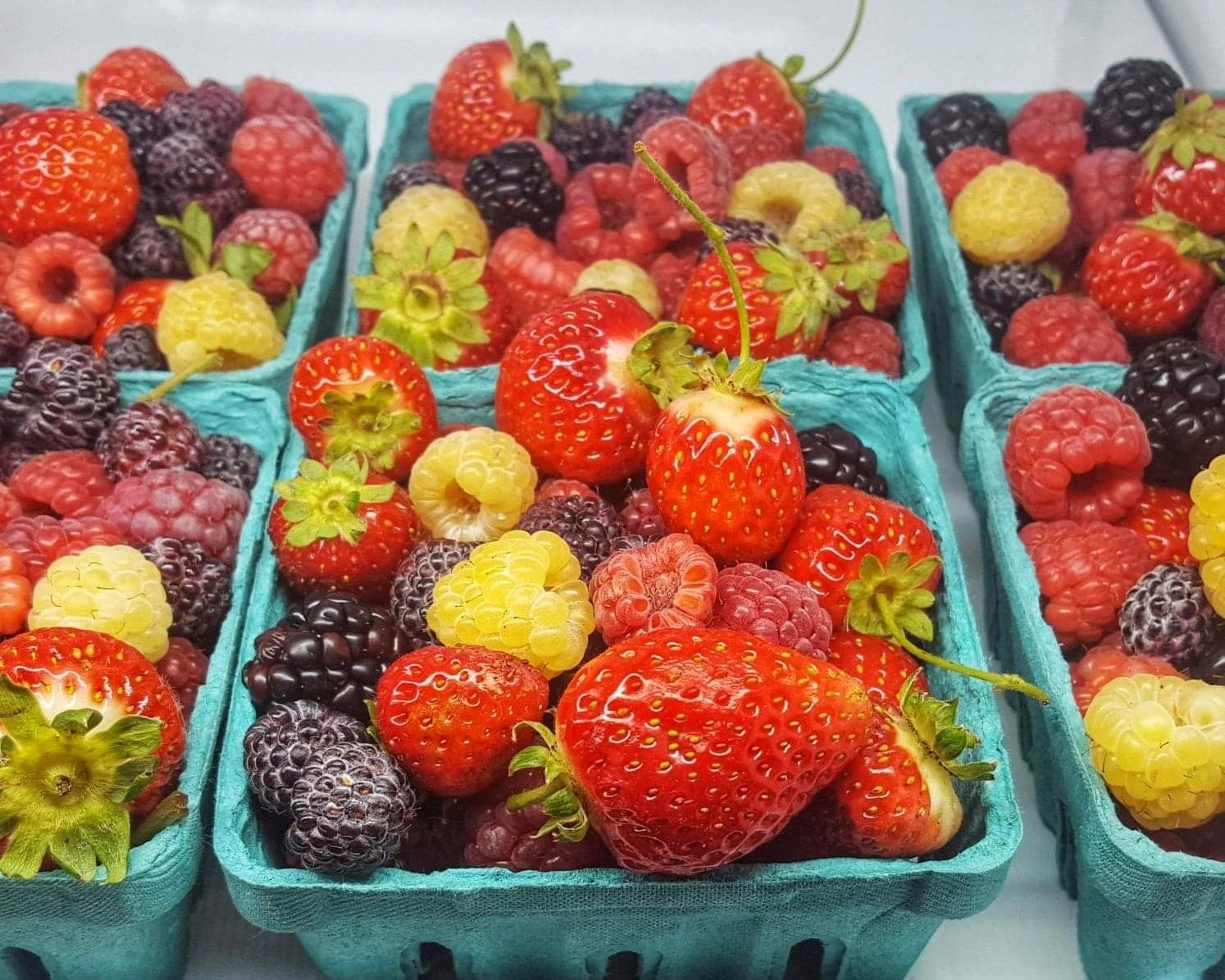With Victory Gardens springing up all over the Ohio Valley and residents reconnecting with the land and the time-honored tradition of working it, it’s a good time to take a look at community gardens.
THE SEEING HAND’S EDELMAN GARDEN
In 2014, the Seeing Hand Association received a plot of land for a garden on Wheeling Island’s S. Broadway Street through the generosity of former Wheeling residents Aaron and Rhoda Edelman. At the time, executive director Karen Haught did some research on how the organization might use it.
“In a lot of places like Africa and other countries, it’s very typical for visually impaired and sometimes blind people to be in gardens,” she said. “What a cool project for my workers, because blind and visually impaired people don’t really get to go outside very often … so their health and wellness kind of gets neglected.”
The Seeing Hand incorporated bamboo trellises and planting tables to help adapt the garden to the workers’ needs and lined the garden’s walkways with woodchips to provide a texture element for navigation.
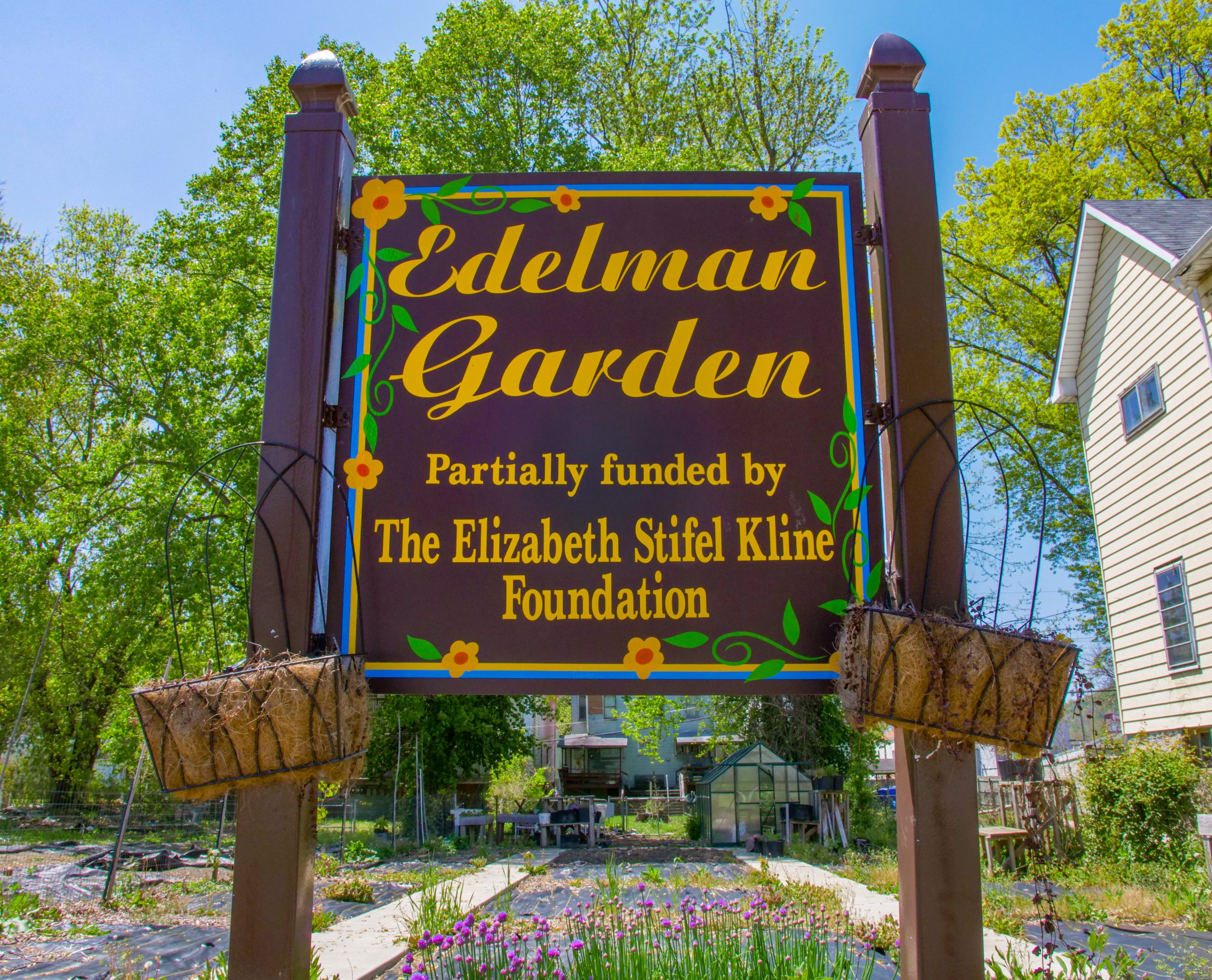
“The first year, we were very basic,” she said, “but what it turned into was this love. The community loved the project and loved the whole idea that we were growing this. We took this really overgrown, vacant lot on Wheeling Island and turned it into something absolutely beautiful.” Additional grants allowed concrete sidewalks for wheelchair access as well as fencing, a shed and a greenhouse. With the expansion came a glut of volunteers: over 100 in a typical season.
The Edelman Garden is beloved by two workers in particular: Debbie Hatfield and John Renforth. Both visually impaired, they’ve put enormous effort into its maintenance and take special pride in the food they grow. Haught explained that John doesn’t leave the house often.
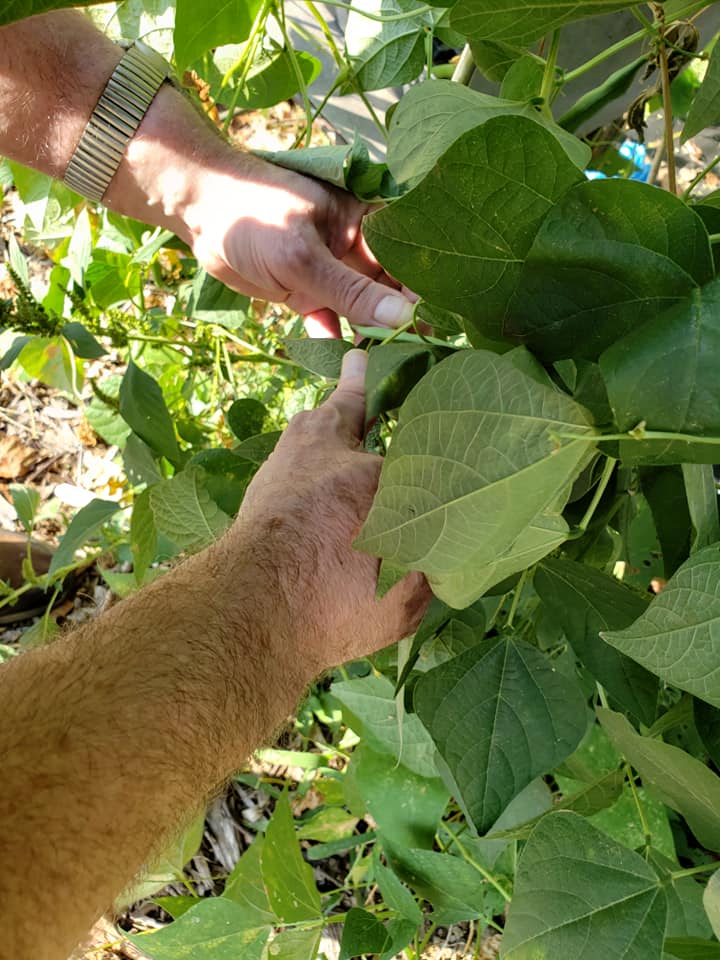
“So a couple years ago, we decided to take him [to the garden], and he was petrified. If you can imagine not being able to see and putting you in a place you’ve never been before and trusting people to navigate [you] around. He has fallen in love with this garden.” Gardener Paula Weisal worked with John to teach him how to harvest tomatoes by touch. It wasn’t an easy task, but he now plants, harvests and weeds.
Debbie Hatfield grew up visually and hearing impaired, and she spent a good deal of time as a child with her grandfather in his garden. When she began working in the Edelman garden, it brought back wonderful memories for her. Toward the end of last year’s season, Haught entered some of Debbie’s and John’s produce and flowers in the Ohio County Fair. To everyone’s delight, they won three blue and four red ribbons.
“They were beyond ecstatic,” Haught said. “They were so happy.”
What grows in the Edelman Garden goes back into the community. Garden manager Meredith Browning-Sterling explained that workers take home what they grow, and the rest is donated anywhere there’s a need.
“This year, our goal was to grow quantity, so that we can kind of spread it around the community because I have a feeling there’s going to be a lot more hungry people this year than normal,” Browning-Sterling said.
RUSSELL NESBITT SERVICES’ GROW GREENHOUSE
At Russell Nesbitt Services Inc., clients participate in workshops through the WATCH program, which provides employment to people with disabilities. One opportunity is the Grow Greenhouse in South Wheeling at 2600 Main St.
“We do something for every season,” said Andrea Kleeh, WATCH Grow Greenhouse supervisor. “We start in January, February, March, growing our plants from seed. We focus mostly on vegetables, annuals and herbs. The clients love coming out to do that because once they take a seed and they put it in the dirt, and they come out a week later, it’s popped up, and they just light up. It’s a whole different realm for them, I think, out here. They actually have the sensory stimulation with the hands in the dirt.”
Kleeh is also a nurse, so she’s familiar with dexterity issues like the ones the clients may face.
“When I first tried to have them plant these seeds, I had to think of somehow to adapt their ability.” Her solution was to wet Popsicle sticks and let the clients use them to pick up the seeds and lay them in the dirt.
“I think it really makes them feel empowered,” she said. “They may have a dexterity issue but they’re doing it.” Moreover, when the clients return to the greenhouse after several weeks, they’re thrilled to see what’s grown. Kleeh says it helps their self-worth to know they did it on their own.
During the early summer season, the Grow Greenhouse carries a variety of hanging baskets and flats, vegetables, herbs and ferns. That season opened May 8, but is now closed until after Labor Day. Plans were to remain open until around Father’s Day, however, unprecedented sales necessitated an early closing. Kleeh noted that they “sold out considerably faster than normal,” and weren’t able to refill the greenhouse.
In September, clients maintain and sell locally grown mums. At Christmas, you’ll find fresh pine, grave blankets and porch pots; at Easter, you’ll find bulbs like tulip and hyacinth.
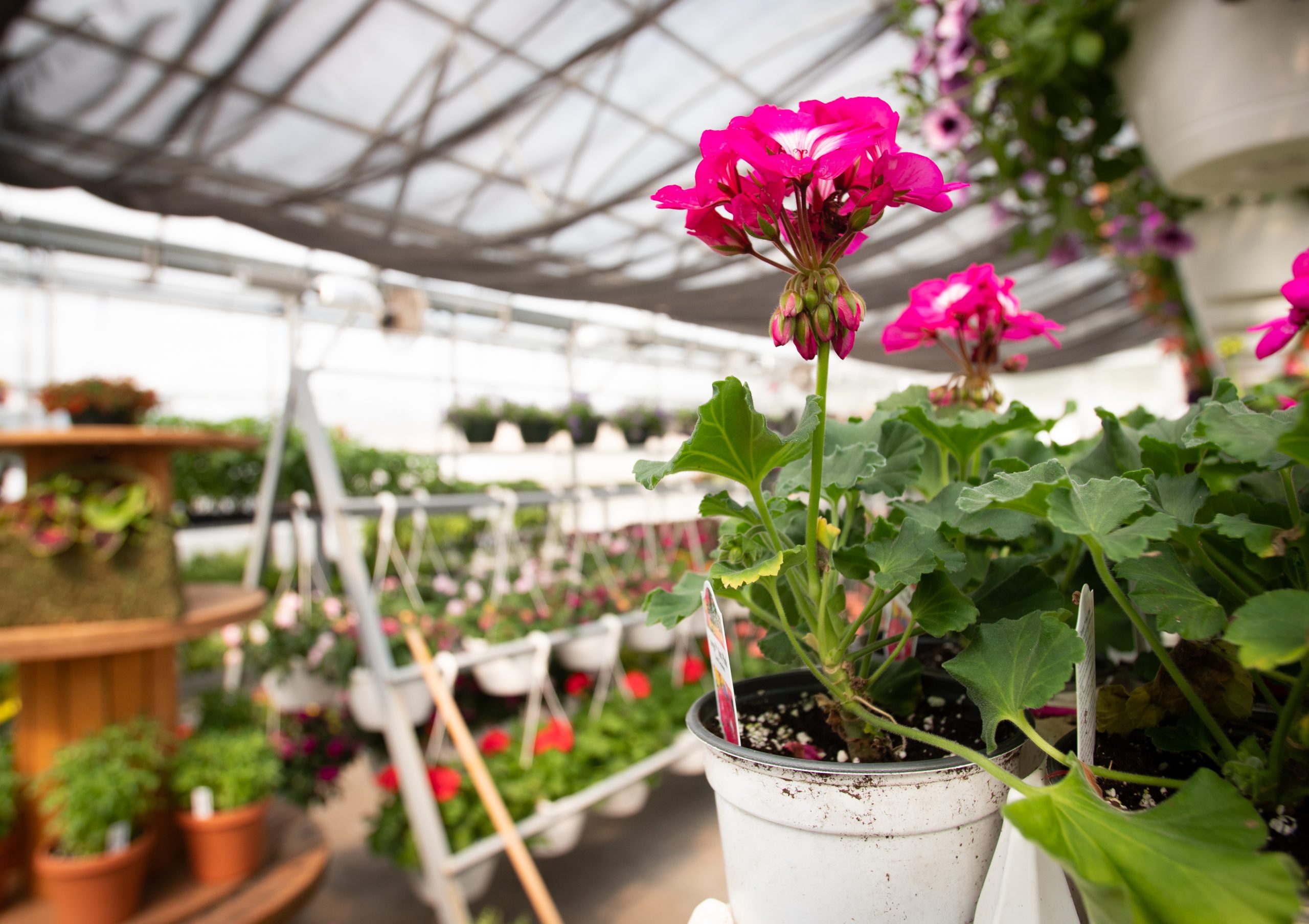
The Grow Greenhouse also operates a small shop that sells specialty items like candles and garden figurines. All proceeds from the Grow Greenhouse and shop go directly to Russell Nesbitt Services Inc., a nonprofit organization.
“Our mission is providing life opportunities to individuals with disabilities. That’s really what this is focused for, to get them some skills. And so, we really rely on community support,” Kleeh said, adding the volunteers are always welcome and appreciated when it is safe to do so down the road.
The Grow Greenhouse is open seasonally, 10 a.m. to 4 p.m. Monday through Friday, and 9 a.m. to noon on Saturday.
SOUTH WHEELING PRESERVATION ALLIANCE’S GORCZYCA GARDENS
Ginger Kabala and Brother John Byrd founded the South Wheeling Preservation Alliance in 2007 to preserve the historical importance of their neighborhood. They’ve had success, as evidenced by its recent addition to the National Register of Historic Places. One fruit of their labor is the Gorczyca Gardens, a once-empty plot of land donated to the group. It sits across from Pulaski Field on Jacob Street. Kabala, Byrd and vital helper Ken Sexton work with SWPA volunteers to keep the green space beautiful and productive during the growing season. A true community garden, you can rent a plot for what Kabala calls a “deer-free gardening” experience in a historic Wheeling neighborhood.
“The majority of our membership grew up down here,” Kabala said. “They just love it. The first garden I ever worked was a victory garden with my dad. I’ve been hooked ever since. You can put a little seed in the ground, and it turns into a bush that gives you three handfuls of green beans.”
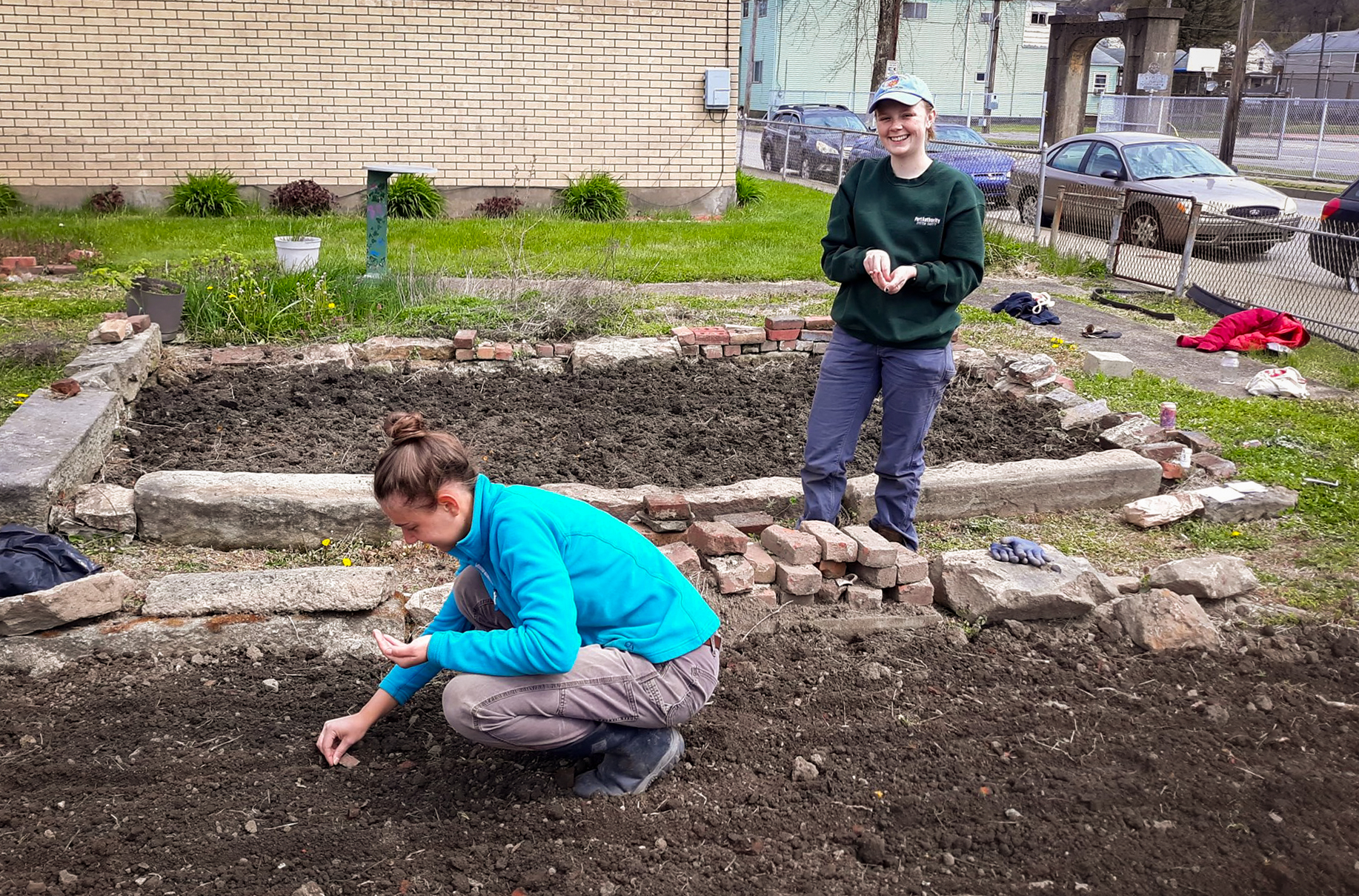
The Gorczyca Garden wouldn’t exist without the generosity of neighborhood partners. One season, a local property owner donated enough soil to fill the raised beds. Swisher International has donated large barrels for water. Asplundh donated woodchips, and the Sisters of St. Joseph gifted a grant for the shed. In turn, SWPA gardeners often give their produce to local food banks and the Soup Kitchen. The organization as a whole supports the Hope Methodist Church Food Pantry.
The garden is a peaceful place that benefits mental wellbeing as well as physical health. Kabala enjoys working in the evenings while kids play baseball nearby. She and Brother John hope that they can continue to generate participation in South Wheeling in coordination with Grow Ohio Valley’s Victory Garden Campaign.
Plot rental options include: 10-foot by 14-foot plot — one for $15, two for $25; or, a 4-foot by 8-foot raised bed — one for $10. The fee covers the cost of on-site water. Gardening tools are available. Beds must be planted by June 1 and put to bed after the season ends. Questions may be directed to Ginger Kabala at 304-233-8917 or Brother John Byrd at 304-232-3618.
GROW OHIO VALLEY’S CSA BASKETS
If you’re a gardener, there are ways to take advantage of the bounty that comes from community gardens and local farmers. Even if you can’t grow in the Ohio Valley, you can still eat the Ohio Valley.
Each season, Grow Ohio Valley offers a subscription to a Community Supported Agriculture (CSA) basket. In it, you’ll receive produce grown by Grow Ohio Valley’s Family of Farms. Among these include Farm 18, Sandscrest, Grow OV greenhouses, Oak Hill Farm, Family Roots and many others.
According to Danny Swan of Grow Ohio Valley, “A CSA-share is a subscription to local farm products, helping farmers prosper while guaranteeing your family the freshest, healthiest foods possible. Practically speaking, it allows farmers to plant their fields specifically for their customers, which means less waste and more productivity.”
Swan believes the coronavirus pandemic only strengthens the need for locally grown food.
“Now more than ever, connecting with your local farmers means safer, healthier and dependable foods from people you know and trust,” he said.
The contents of a CSA basket will change as the growing season progresses. An early summer basket may include lettuce, kale, basil, berries, cabbage, carrots and beets; a late summer basket will probably contain eggplant, apples, melons, squash, tomatoes, onions, peppers and corn. Pick up the basket each Wednesday in East Wheeling, for 15 weeks, starting in June. A subscription costs $450 for a Classic Share CSA basket, which is suitable for a family of four and makes about five meals. Couples may want to opt for the Basic Share Basket for $250, which will feed two people roughly three meals.
SNAP shoppers will receive half-off a subscription and can subscribe for $225, paid in monthly increments using SNAP benefits. More information is available at Grow Ohio Valley’s website and on their Facebook page.
• Laura Jackson Roberts is an environmental writer and humorist in Wheeling, West Virginia. She holds an MFA in creative writing from Chatham University and serves as the Northern Panhandle representative of West Virginia Writers. Her hobbies include hiking, travel and rescuing homeless dogs. Visit her at laurajacksonroberts.com.


